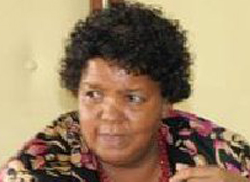Wanjiku Mukabi Kabira is an Associate Professor of Literature at the University of Nairobi, an author and a literary critic. She has published widely in the areas of oral literature, culture, governance, constitution-making and gender issues. She took the first steps towards a literary career in 1965 when she wrote and recited a poem titled Virus as a Form One student at Loreto Girls’ High School, Limuru. She had just completed her primary school education at Githirioni Primary School in Lari and was astounded by the feeling that comes from creating and performing.
In high school she immersed herself in reading Western authors such as Shakespeare and James Joyce, up to the time she proceeded to Loreto Convent Msongari for her ‘A’ level education.
She first came into contact with African literature, and particularly oral literature, in 1976 when she joined the Department of Literature at the University of Nairobi. She was taught by the likes of Ngugi wa Thiong’o, Taban Lo Liyong and Okot p’Bitek who had a profound influence on her. Upon graduating in 1978, Kabira went on to become a teacher at several schools in the country, at both primary and secondary levels, and continued to write. During this season in 1979, her play What a World, My People! was banned by the Kenya Government. She wrote several books on women’s issues such as A Letter to Mariama Bâ, a response to Mariama Bâ’s So Long a Letter. Other books that she has written include They Have Destroyed the Temple and Celebrating Women’s Resistance. She received her Master of Arts degree in Literature in 1980 from Wisconsin University in the US and in 1994, her PhD in Literature from the University of Nairobi. She has published numerous academic papers on the oral literature of various communities in Kenya and on issues of gender and development.
Kabira is also known for her role as a champion for women’s empowerment, and her work portrays this. Her book, A Time for Harvest, traces women’s journey in the struggle for a new constitution in the past 20 years, from 1992 to 2012. Her work with women so led to the founding of the African Women Studies Centre at the University of Nairobi in 2011, where she currently serves as Director. She believes that mainstreaming African women’s perspectives is necessary in academic and development matters, as it offers a comprehensive view of the world, and that there is a need to document the African woman’s experiences, struggles, worldview and contributions to development. Kabira has served on several Boards and Commissions in various capacities, and continues to do so. From 1986 to 1998, she was the Chairperson of the Kenya Oral Literature Association. She also served as Vice Chairperson and Commissioner in the Constitution of Kenya Review Commission (CKRC) from 2004 to 2005. She was the Chairperson of the Women’s Political Alliance Kenya (WPA-K) from 2000 to 2011, and continues to contribute to the institution as a Board member today. She is also on the Board of the Collaborative Centre for Gender and Development (CCGD) which she helped found in 1995, the International Centre for Research on Women (ICRW), as well as the publication Governance in Africa. In 1999 Kabira received the Woman of the Year award from the American Biographical Institute.
In 2014 she was awarded the Elder of the Order of the Burning Spear (EBS) and in 2015 the Ministry of Devolution and Planning honoured her with the Legacy Builders Recognition award. Kabira continues to be a role model for women all over the country.
